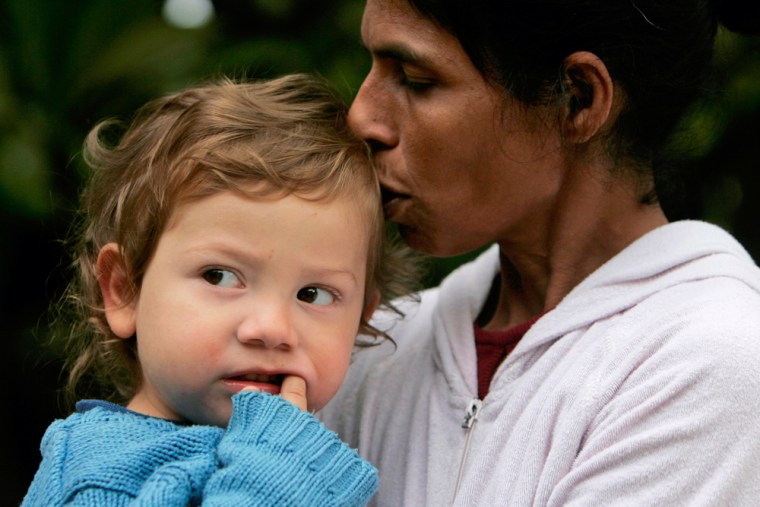Sandra Samuel had one thought as she huddled for safety between two refrigerators in the besieged Jewish center in Mumbai: the safety of the 2-year-old boy in her charge. The moment he cried out for her, she ignored the crackle of the gunfire and the explosion of the grenades that rocked the building, charged up the stairs and whisked the boy away from the motionless body of his mother to safety.
Today, the Orthodox Jewish toddler's only tie to his life in Mumbai is the Christian woman who rescued him. His Israeli parents died in the assault. Samuel, a recent widow, has given up her life in India and left her two sons, aged 18 and 25, to move to Israel, where she says she will stay "as long as my baby needs me."
For five years and four months, Samuel worked for Rabbi Gabriel Noach Holtzberg and his wife, Rivkah — whom she calls "my rabbi" and "my Rivki" — in the Mumbai headquarters of the Orthodox Chabad-Lubavitch movement. It was to have been a temporary job, but she says she was so captivated by the giving, courageous couple that she stayed on — until their death at the hands of at least two gunmen who struck on a murderous late-November night.
The five-story building was besieged for some 36 hours before Indian commandos, some rappelling onto the roof of the structure from a helicopter, stormed it. When the raid was over, six Jews were dead — among more than 170 killed in synchronized attacks on 10 points across Mumbai, India's commercial center.
Moshe's great-uncle, chief rabbi Yitzhak David Grossman of the small northern Israeli town of Migdal Ha-emek, used his influence to immediately get Samuel a one-year passport and a three-month tourist visa to Israel so the boy would have a familiar face to see in the midst of the trauma.
A world away
Sabine Haddad, a spokeswoman for Israel's Interior Ministry, said Interior Minister Meir Sheetrit wants to grant Samuel the status of "Righteous among the Nations," an honor bestowed upon non-Jews who save the lives of Jews, which would allow her to stay in Israel as long as she wished.
Since arriving in Israel last week, Moshe and the slight, soft-spoken Samuel, 44, have been living in Grossman's home. There, a world away from the sprawling, high-intensity Mumbai, she is the only link between Moshe and the life he had with his parents in India — the only life he knew.
At the Grossman house, the boy has the run of a garden and a spacious patio, and a tranquility he would not find in the homes of his mourning grandparents. On Monday, the smiling toddler cheerfully touched and identified in English the animal statues that rim the patio garden. But he sought out Samuel repeatedly, smiling when he nestled in her arms.
"At the beginning, he would burst out crying, but that's tapered off," Grossman said. "But he clings to Sandra."
Still, Samuel says, "he is a baby. He wants to know why his Ima (mommy) is not coming, why is Abba (daddy) not coming," using the Hebrew terms.
After the initial mourning period for Moshe's parents ends later this week, the boy and Samuel will move in with Rivkah Holtzberg's parents in nearby Afula, though no permanent custody arrangement has been settled. A fund has been set up to provide for the boy.
An elder brother died of an undisclosed genetic disease, and another brother who also has the disease is institutionalized in Israel.
Ordinary day gone awry
Samuel said it had been an ordinary day at Chabad on the day of the attack. She had just put the baby to sleep and the dining area was being cleaned up when "suddenly the noise starts. Boom, boom, boom," she recalled.
A man with a gun took aim at her
At first, she thought it was children playing in the open space outside the house. She came out of the kitchen to scold them when she saw a man with a gun take aim at her. She banged the door shut, not sure yet if the gun was real or a toy — until she saw the door had cracked.
She dialed the rabbi's cell phone, heard a mix of voices, but still didn't understand that the house was under attack — until the explosions and shooting kept on. There was no screaming from upstairs, where the hostages were, though she said she did hear Rivkah Holtzberg cry and call out her husband's name, and heard things being thrown and shoved.
Samuel left her hiding place the following morning only "when I heard my baby cry." She says he called out her name, and that she found him standing and crying by his mother's body, his pants soaked with blood. The rabbi and his wife were lying in a corridor, she said, he lying on his stomach, she lying on her side. She said she also saw the bloody legs of another man.
Samuel wonders whether the attackers might have knocked the boy unconscious. She said he had five finger-shaped bruises on his back, and did not cry out during the night as he tended to do, she said. A spokesman for Chabad in Israel, Menachem Brod, has said the family did not think the boy had been abused.
Samuel said she did not think on the night of her escape that the Holtzbergs were dead, though she did see a small amount of blood near the rabbi's leg. "When I saw Rivki, she didn't have a tiny mark on her," she added.
Samuel is having trouble coming to terms with the horror of the attack.
"Even now, I can't really believe it has happened," she said.
